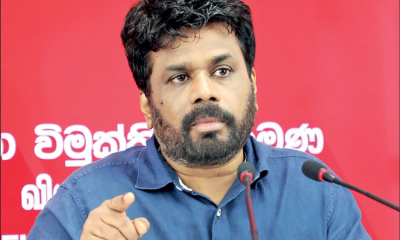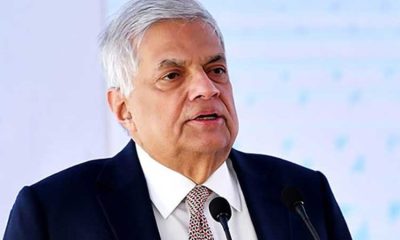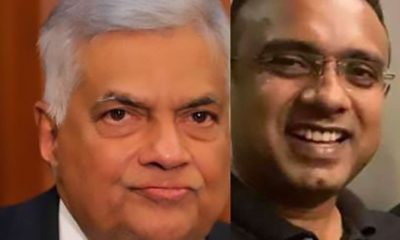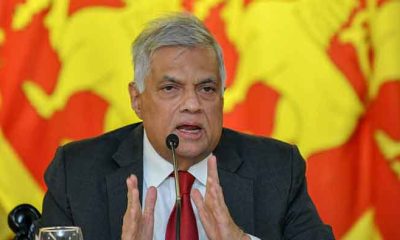Editorial
Diana Gamage and Ajahn Brahm

Tourism State Minister Diana Gamage, whose eligibility to remain a Member of Parliament has remained an open question for a long time now since she ceased her allegiance with the Samagi Jana Balavegaya (SJB) on whose National List she entered the legislature in 2020, was back in the news last week. The Appeal Court determination of an action challenging her continuance as an MP, that was due to be delivered on Tuesday, has now been postponed for July 25 by a two-judge bench. This made front page news nationally.
No reason for the delay has been publicly adduced. While it is not uncommon for the courts to sometimes reserve judgment sine die, it is less frequent for dates specified for delivery of such orders being further delayed. However that be, those anxious to know – and there are many such – whether a second glamorous lady MP was being ejected from the legislature (well know actress Geetha Kumarasinghe was the first) will now have to wait longer to get an answer.
Gamage, once called Princess Diana in parliament by her boss Minister Harin Fernando, has been a controversial figure. When UNP leader Ranil Wickremesinghe and his deputy, Sajith Premadasa, parted company before the last parliamentary election, the then unrecognized SJB had to acquire an already recognized party to field its candidates at those hustings.
This was provided by Gamage and her husband, Senaka de Silva, a retired military officer who was a key ally of General Sarath Fonseka when he ran for president. No doubt Gamage’s appointment to the House on the SJB National List and her appointment as Deputy Secretary or that party was part of that arrangement. As recently as last week, SJB General Secretary Ranjith Madduma Bandara claimed in parliament that Gamage does not hold party office citing the Election Commission’s website as evidence.
Madduma Bandara went so far as saying that the SJB made a mistake in acquiring a party “from people who make faked documents.” He said that buyers examine the pedigree “even before buying a dog.” But apart from admitting the “mistake,” he didn’t elaborate on his party’s failure if not culpability. However that be, the public are entitled to know in what manner the continuing problem of the long list of parties officially recognized by the election authorities is going to be resolved once and for all. There is no escaping the reality that the recognition of factually non-existent ‘ghost’ parties enable shady arrangements that have been made time and again for opportunistic reasons.
The SJB today no doubt wishes to see the back of Diana Gamage who claims “ownership” of that party not only from its list of office bearers but from parliament as well. Although there are provisions in the law to disqualify MPs who had entered the legislature under the proportional representation system from continuing to sit and vote in parliament after being expelled by their parties, this provision has not been successfully invoked for a very long time. The reason for this has been attributed to a past judgment of the Sarath Silva Supreme Court.
Former President Gotabaya Rajapaksa went through a long drawn process to renounce his U.S. citizenship to successfully run for president in November 2019. Given the way events played out and the difficulty he had in finding a permanent domicile after his unceremonious departure from office last year, he may well be regretting that decision or even enjoying that “one crowded hour of glorious fame” rather than an age without a name. In this case though he did have a long tenure as a war-winning Defence Secretary.
GR eventually returned home to the lavish pension and perquisites this bankrupt country accords its past rulers. There have been recent reports that Rajapaksa has now been assigned a second government bungalow, previously used by the foreign minister as his official residence. This was because the first at Malalasekera Mawatha was deemed “too noisy.” The aragalaya did get rid of Gotabaya and Mahinda Rajapaksa, but the much yearned for system change was not to be. Business continues as usual as far as our politicians are concerned.
The headline for this commentary was purely applied to describe the content of this editorial and not compare two personalities. There obviously can be no comparison between the two personalities named. Ajahn Brahm is a highly accomplished Buddhaputra and this country was privileged to host him for nine days recently. His visit gave boundless joy to thousands of Buddhists able to benefit from both his wisdom and his presence. The spot of dung so often polluting the pot of milk in this country unfortunately turned up when Ajahn’s departure for Australia via Singapore was delayed for as long as 12 hours. This was as a result of the anxiety of officials to stooge political panjandrums at the expense of looking after the venerable monk.
His reaction to the incident over which the president is reported to have ordered an inquiry was typical of the bigness of the man. He didn’t want fault finding or punishment imposed on whoever culpable and advised focus on what really matters. We are sure that Ajahn did not seek VIP lounge facilities or privileges for himself. These were probably arranged without his knowledge. If he was not in the VIP lounge and not at the mercy of those responsible for his misadventure, he would most probably have not missed his flight. There are many lessons for all of us to learn from Ajahn Brahm. Among these are the spirit of generosity he has demonstrated and the ability not to dwell on irritants that are past.
Editorial
Address root causes of road fatalities

Monday 12th May, 2025
A tragic road accident near Kotmale claimed 21 lives yesterday and left 35 others seriously injured. Disaster struck when a state-owned bus plying from Kataragama to Kurunegala via Nuwara Eliya, veered off a winding road and plunged down a precipice. Yesterday’s tragedy has jolted politicians and officials alike into action, but it is bound to be forgotten soon. Sri Lanka lacks a proper national strategy to prevent road fatalities. Hardly a day passes without a fatal road traffic accident being reported. About 2,243 people were killed and 4,552 others seriously injured in road accidents in 2024. Of those mishaps 2,141 were fatal.
The cause of yesterday’s accident had not been established at the time of going to press. The ill-fated bus had gone out of control due to a technical fault, according to some reports, but a survivor has been quoted as saying the vehicle was speeding. One can only hope that the police, the SLTB and the Transport Ministry will conduct a thorough probe into Sunday’s accident and take action to prevent such tragedies.
A World Bank report, Delivering Road Safety in Sri Lanka; Leadership Priorities and Initiatives to 2030, reveals that ‘the high road crash fatality and injury rates on Sri Lanka’s roads undermine the economic growth and progress made over the past decade on reducing poverty and boosting prosperity’. The report says the annual crash deaths per capita in Sri Lanka are twice the average rate in high-income countries and five times that of the best performing countries in the world! Sri Lanka reportedly has the worst road fatality rate among its immediate neighbours in the South Asia region.
It has been revealed that many drivers operate while being impaired by alcohol or drugs. In 2021, then the government disclosed that about 80% of the private bus drivers in Colombo and its suburbs were under the influence of drugs while on duty. The situation must be more or less the same where other heavy vehicle drivers are concerned. Trucks ply like bats out of hell on busy roads, terrorising other road users, making one doubt the sobriety of their drivers. The initial detection of impaired driving with visual inspection is relatively easier where drunk drivers are concerned, but the task of nabbing drugged divers is far more difficult. Hence the need for methods such as random roadside drug tests.
Complaints abound that passenger buses are not properly maintained or even regularly cleaned. Their owners try to teach politicians how to govern the country while they are doing precious little to operate their own buses in a civilised manner. Successive governments have not cared to arrest the deterioration of the SLTB, much less develop it to provide a better service. About 2,000 SLTB buses are out of service, mainly for want of spares, according to the Transport Ministry, and the roadworthiness of the ones in operation is reportedly in question. No surprise that the SLTB fleet is plagued by technical defects.
Meanwhile, a road safety expert, a few years ago, proposed that bamboo be planted on the slopes adjacent to curvy roads to stabilise soil, maintain the integrity of land in those areas and complement engineered structures such as guardrails to prevent vehicles from plunging down precipices. Nothing much has since been heard about this proposal, which deserves the attention of the authorities responsible for ensuring road safety.
Road safety experts have identified the following factors, inter alia, as the common causes of crashes on expressways and other roads in Sri Lanka: speeding, distractions, recklessness, fatigue, driving under the influence of alcohol or narcotics, inclement weather conditions, inadequate road conditions, tailgating, improper lane changes, inexperience of drivers, overtaking dangerously, poor visibility, unroadworthy vehicles, poor signage or lack of road markings and impatience or time pressure. One of the aforesaid factors or a combination of two or more of them could lead to fatal accidents on any road. So, any strategy to prevent road mishaps consists in addressing those causes.
One can only hope that yesterday’s tragic accident will galvanise the authorities concerned to make a truly national effort to save lives being lost on roads.
Editorial
Pope Leo XIV: A shepherd who smells of his sheep

The missionary life is no highway paved with comforts. It is a journey of grit and grace, often walked amid many difficulties and hardships. You leave behind your homeland, your language, your family and begin afresh in lands where your name means nothing and your faith is everything. You must learn to speak a new language, eat what the people eat, walk where they walk and suffer as they suffer. It’s not a life for the fainthearted, but for those made of sterner stuff and deeper faith.
Two such men embodied that calling. One was Guillermo Steckling, a German Oblate who served with distinction in Paraguay. The other, an American Augustinian named Francis Prevost, laboured in tough terrains of Peru. Their missionary work was not just about building churches but about building lives – working alongside the poor, walking with the marginalized and anchoring the Church in places long forgotten by power.
They were, quite literally, men with little say but had big hearts to help the poorest of the poor and the marginalized. But Rome had its eye on them. Their work bore such fruit that both were called to lead their global congregations. Steckling became Superior General of the Oblates and Prevost Prior General of Order of St. Augustine.
Still, Pope Francis, ever the shepherd with a nose for humble holiness, sent them back – not to offices in Rome, but to the dusty front-lines where they had made their mark. Steckling returned to Paraguay as Bishop. So did Prevost in Peru. Pope Francis loved missionaries and he knew they were capable men. It was a move as pastoral as it was prophetic – a strategy to shape the future leadership of the Church not through ambition, but through service.
Today, that same Francis Prevost has succeeded his mentor Pope Francis as Pope Leo XIV – shepherd of 1.4 billion Catholics worldwide. A professor of Canon Law and a mathematician by training, he was never considered a front runner for pope by Vatican watchers. In fact, when he entered the Sistine Chapel for the Conclave, he had been a Cardinal for barely two years. Yet, four ballots later, the white smoke rose.
Cardinal Prevost’s election recalls the October Conclave of 1978, when little known Karol Wojtyła, the Polish Cardinal who became John Paul II. But unlike 1978, where a stalemate between Italian heavyweights led to a compromise choice, this time the Cardinals rallied behind Prevost early. The two-thirds majority came swiftly after four ballots unlike in 1978 where they had eight ballots.
When he stepped onto the balcony of St. Peter’s Basilica, his first words were not lofty proclamations, but a whisper to a wounded world: “Peace be with you.” In an age riven by conflict – in Gaza, in Ukraine and in Kashmir – his greeting rang out like balm on an open wound.
Pope Francis had often urged global leaders to be instruments of peace. Pope Leo XIV seems poised to carry that mission forward – not with diplomatic finesse, perhaps, but with the moral weight of a man who has lived among the poor and who speaks not from a podium but from the heart.
He has never shied away from uncomfortable truths. Even before his elevation, Cardinal Prevost voiced his concerns over U.S. immigration policies, particularly the practice of separating children from their families. He took on Vice President J.D. Vance – a fellow Catholic – when Prevost said, “Jesus does not ask us to rank our love.”
He may be the first American Pope, but he does not carry the triumphalism that often trails that label. Born in Chicago, yes – but shaped in Peru. His spiritual passport bears the stamps of Lima’s slums, not Washington’s corridors. His theology is rooted not in ideology but in going after the lost sheep.
His choice of name – Leo – is a signal in itself. The last to wear that name was Leo XIII, the great “Pope of the Workers,” who reigned for 25 years at the turn of the 20th century and became a beacon for social justice. Leo XIII was the author of an encyclical that championed the rights of labourers and demanded dignity for those who toil. It was a milestone in Catholic social teaching. By invoking that name, Pope Leo XIV seems to be saying: the mission continues.
Indeed, for centuries the papacy was seen as Rome’s to keep. That hold was first broken in 1978. John Paul II broke barriers in a papacy that ran for 27 years.
This time, many assumed the pendulum would swing back to Italy, especially with several seasoned Italian Cardinals in contention. But the College of Cardinals, guided by the spirit of Pope Francis, chose not a bureaucrat, nor a diplomat – but a missionary. A man who has “the smell of the sheep.”
Pope Leo XIV may have entered the Conclave a rank outsider; he now carries the keys of St. Peter to further Pope Francis’ mission and vision for the church.
Editorial
Loopholes render a vital law hollow

Saturday 10th May, 2025
The much-awaited Local Government (LG) elections are over, but political battles continue. The government and the Opposition are all out to gain control of the hung local councils, which outnumber those with clear majorities. This issue has distracted the public from a crucial issue––campaign funding and expenditure. The NPP obviously outspent its rivals, who also must have spent huge amounts of funds on their election campaigns.
The Election Commission (EC) has asked all candidates who contested Tuesday’s LG elections to submit detailed reports on their campaign funding and expenditure, on or before 28 May. Commissioner General of Election Saman Sri Ratnayake has said this process is part of the EC’s efforts to ensure transparency and accountability in the electoral process. The EC has issued this directive under the Election Expenditure Regulation (EER) Act No. 03 of 2023, which requires all candidates to submit returns of donations or contributions received and expenditure incurred in respect of an election, to the EC within twenty-one days of the date of publication of the results thereof.
The EER Act has fulfilled a long-felt need. However, it contains serious flaws, which have stood in the way of its enforcement. Truthfulness is not a trait attributed to Sri Lankan politicians, and therefore the returns of campaign funding and expenditure are falsified in most cases, and they reveal only a fraction of campaign funds and expenditure. These returns are not subject to scrutiny. This has stood unscrupulous candidates in good stead, and the goal that the EER Act was intended to achieve remains unfulfilled due to the loopholes in the new law.
Unless the flaws in the EER Act are rectified urgently, it will not be possible to arrest the erosion of public trust in the electoral process. Election campaigns usually serve as a key enabler of money laundering and various forms of corruption in this country, as is public knowledge. Party war chests are the ground zero of corruption, as we argued in a previous comment, for they pave the way for undue influence, policy manipulations, etc.
One may recall that the perpetrators of the sugar tax racket under the Gotabaya Rajapaksa government were the financiers of the SLPP. The UNP benefited from the largesse of the Treasury bond racketeers ahead of the 2015 general election.
The submission of falsified returns of campaign funding and expenditure has made a mockery of the EER Act. Some anti-corruption outfits and election monitors have been demanding amendments to the EER Act to rectify its flaws. Their campaign deserves public support.
The incumbent NPP government came to power, vowing to eradicate corruption, and therefore it will have to ensure that the EER Act is rid of loopholes and noncompliance is severely dealt with. It is hoped that either the government or the Opposition will take the initiative without further delay, and Parliament will unanimously ratify the amendments to be moved.
-

 Business7 days ago
Business7 days agoAitken Spence Travels continues its leadership as the only Travelife-Certified DMC in Sri Lanka
-

 Latest News6 days ago
Latest News6 days agoNPP win Maharagama Urban Council
-

 Business7 days ago
Business7 days agoLinearSix and InsureMO® expand partnership
-

 Features2 days ago
Features2 days agoSAITM Graduates Overcome Adversity, Excel Despite Challenges
-

 Business5 days ago
Business5 days agoJohn Keells Properties and MullenLowe unveil “Minutes Away”
-

 Sports2 days ago
Sports2 days agoASBC Asian U22 and Youth Boxing Championships from Monday
-

 News2 days ago
News2 days agoDestined to be pope:Brother says Leo XIV always wanted to be a priest
-

 Foreign News3 days ago
Foreign News3 days agoMexico sues Google over ‘Gulf of America’ name change
























